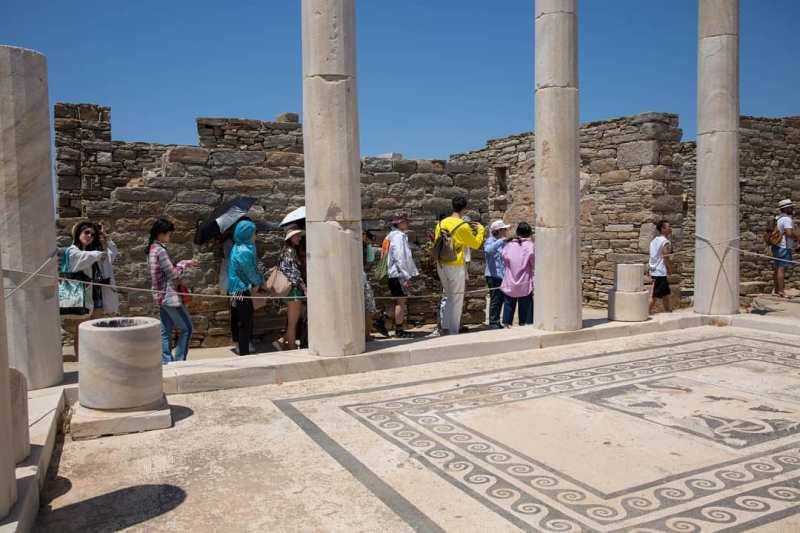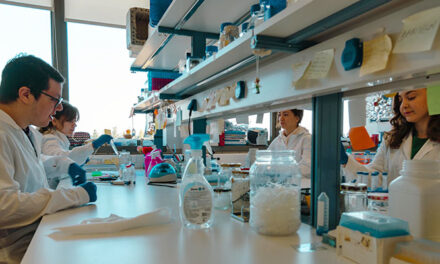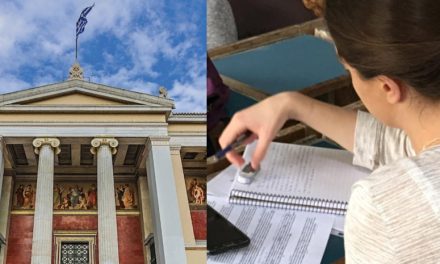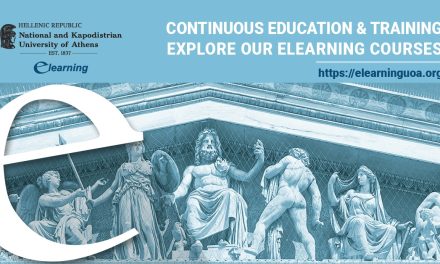The first English-language undergraduate programme on ancient Greek culture organized by the National and Kapodistrian University of Athens in collaboration with the International Hellenic University welcomed its first international students last September. Despite the difficult conditions caused by the pandemic the programme ran smoothly attracting the interest of many international students. The submission of applications for the ‘BA Programme in the Archaeology, History and Literature of Ancient Greece’ for the academic year 2021-22 has already begun offering the opportunity to those interested in classical studies to pursue a programme right where Greek culture was born and created. It is worth mentioning that courses are combined with educational visits to archaeological sites in Greece offering also students the opportunity to participate in excavations around the country.
So far more than 60 applications have been submitted since the beginning of the programme, while the 28 participants of this first academic year originate from countries across the world such as Canada, the US, El Salvador, Kenya, Egypt, Morocco, Palestine, the UAE, Albania, Bangladesh, and China.
Greek News Agenda* had the opportunity to speak with Professor Eleni Karamalengou, academic director of the BA programme and professor of Latin literature at the Faculty of Philology at the University of Athens. Prof. Karamalengou explains how this English-language programme was designed highlighting its comparative advantages. She also analyses the contribution of Greek studies to the understanding of modern societies emphasizing the significance of humanities at a critical time for society.
The first English-language undergraduate study programme organized by a public Greek university on ancient Greek culture is now a fact. How was this programme designed, and how did it progress during the first year of its operation given the difficult conditions caused by the coronavirus pandemic?
Following a three-year preparation phase, the degree programme in September 2020 welcomed its first international students, who came from ten different countries, and it has been operating normally since then. The winter semester courses and exams have been completed and spring semester has already begun. The creation of this programme was based on the finding that many foreigners who did not speak Greek were interested in studying in Greece and, what’s more, pursuing a programme of studies on Greek culture. Our decision was reinforced by recent experience from the implementation of successful Greek-language programmes at the School of Philosophy aimed at international students in the framework of bilateral agreements with Universities abroad. Although the conditions of the pandemic are not really favourable for the initiation of a new studies programme, nonetheless, the students who had been accepted prioritised their desire to come to Greece and physically attend classes. According to many of these students, they had been waiting for a long time to be given such an opportunity through the creation of an English-language programme. During the initial period of their studies, when classes were physically attended, all necessary measures were taken to ensure the safety of students and teachers. When in-person instruction later switched to distance learning, following government guidelines on account of the pandemic, the students remained in Greece and smoothly adapted to the new situation. We hope that the eventual improvement of health conditions will increase the number of applications to this programme.
In your opinion, what are the comparative advantages of this degree programme, given the plethora of similar programmes of study around the world?
This is a high standards degree programme, firstly in terms of its conception, as it holistically combines the disciplines Archaeology, History and Literature in an original and harmonious way. These high standards are also reflected in the quality of studies, the organization of the programme as well as in the academic and administrative staff who run it. One of its main advantages of course lies in the fact that students have the opportunity to study Greek culture right where this culture was born and created. Course instruction includes university classrooms as well as onsite educational visits to the great monuments of this civilization, as for example the Acropolis, Ancient Olympia, Delphi, Vergina and more. Moreover, students have the opportunity to participate in excavations around Greece conducted by the University of Athens or other Institutions. This is a unique experience, which every student of classical antiquity has undoubtedly been dreaming of.
At the same time, students have free access to Modern Greek language classes at the Modern Greek Language School of the National University of Athens (NKUA).
Why, in your opinion, would a young person from another country today choose to study ancient Greek culture? What could Classical Studies mean to such a student?
Classical Studies are by their very nature an interdisciplinary field of global research and educational scope emphasizing, among other things, the significance of humanities at a critical time for society. Greek and Roman antiquity embody values inherent in the structure of modern societies, reinforcing their activation and evolution. Philosophy, democracy, art, theatre and classical architecture are reflected in the modern world. Looking into the roots of European civilization sheds light onto its current manifestation. Through the comparative study of other civilizations from prehistoric to modern times, the degree programme underlines their fundamental connection with Greek civilization and their effect on the evolution of humanity. Studies in Greek classical antiquity build solid foundations towards the knowledge of and creative improvement of the global present. It is no coincidence that there is a wide international interest in movies, video games, etc. referring to Greek antiquity.
Finally, these undergraduate studies offer remarkable opportunities for a wide range of postgraduate studies and further scientific specialisations as well as relevant career prospects.

You are scientific director of the programme and closely monitoring its progress. Could you tell us about the impressions of these students who participated in the programme for the first time, taking of course into account this year’s extraordinary conditions? How did the University of Athens help students to organize their daily life in the city?
Students’ impressions were very positive and they seem to be coping well and dealing calmly with these unique conditions brought on by the pandemic. This became evident not only in their formal evaluations of the programme, but also from their statements to the press about their studies. They speak with enthusiasm about Greece, their courses, their teachers, the academics and administrators running the programme. Here are some of their statements:
[“The combination of educational acquaintance with ancient Greece and living in Greece is irreplaceable,” says Amy Dugan from the United States. “What impressed me most is the care, passion, warmth, dedication and support of the academic and administrative staff. I’m really happy with the lessons and the teachers,” says Εlisabeta Mosho from Albania. Kathimerini newspaper, English edition 5/4/2021 “Foreign students thrilled with English-language BA course”]
[“My family has its roots in Samos”. “I remember my grandfather telling me stories about Greece and then all the reading I did at school made me take an even greater interest in the land of my forebears” (Emmanual Galanos, USA). “This is such an opportunity, to study archaeology in Greece” (Anas Bouzaggaoui, Morocco). “I have traveled to Greece several times already, and I love the culture, the people, the landscape, the architecture and the history of this country” (Ma Danni, China). Kathimerini newspaper, English edition 8/10/2020 “Greece’s first English-language BA makes its grand debut”]
The University of Athens assisted every student of the programme in every step, from their arrival to their adjustment in Athens. The students were assisted in their transfer from the airport, in obtaining housing, a taxpayer registration number and a Greek bank account, in arranging residence permits, etc. In their daily life, students turn to the programme registrar for any related information as well as for advice of wider interest.
* Interview by Ioulia Elmatzoglou. Language editing by Magda Hatzopoulos.
Photos courtesy of Prof. Karamalengou and the BA programme.
The Programme at a glance
The BA Programme in the Archaeology, History and Literature of Ancient Greece is offered by the Faculty of Philosophy of the National and Kapodistrian University of Athens (NKUA), a historical University that since 1837 has distinguished itself, innovated and consistently been highly ranked in international university rankings. The BA Programme brings together three collaborating disciplines from the field of Classics; the Programme’s multi-disciplinary curriculum, taught by a diverse staff consisting of highly specialized academics and senior researchers, combines the strengths of the three disciplines in a single, innovative Degree.
• Duration of the study program: four (4) years (eight academic semesters)
• Tuition fees: 6.000 Euro annually
• Total amount of ECTS required to successfully complete the program: 248 ECΤS
• Admission Requirements are listed in detail on the program’s website https://baag.uoa.gr
• Email for inquiries: info@baag.uoa.gr
• Online submission of applications: https://baag.uoa.gr/application
I.E.
TAGS: ARCHEOLOGY | EDUCATION | GREEK LANGUAGE | HERITAGE | HISTORY | INTERNATIONAL RELATIONS | STUDY IN GREECE













